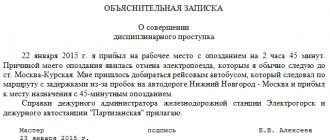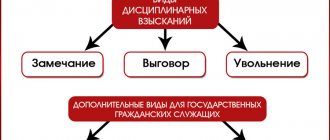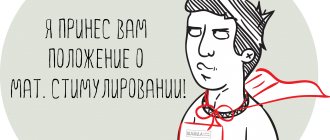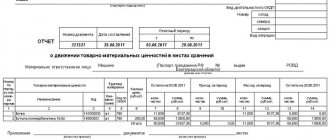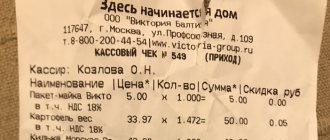general description
The Labor Code of the Russian Federation establishes that disciplinary action is a measure of punishment for an employee for misconduct, which consists of failure to fulfill his or her job duties or their improper performance. Violations of such regulations and agreements as:
- job description,
- orders from the manager;
- labor legislation;
- contract;
- inner order rules.
https://youtu.be/waSGO6Q2RSY
The impact on the employee is made through intangible means, after which the risk of committing a repeat violation will be significantly reduced due to the fear of inevitable punishment. The current labor legislation establishes certain grounds for penalties. These include both serious violations, for example, being drunk at work, and less serious offenses, for example, being late.
Avoiding punishment is not difficult. The employee only needs to take his job responsibilities responsibly and comply with the discipline rules and labor safety standards established at the enterprise.
Types of penalties
Clarifying comments to Art. 192 and 193 of the Labor Code of the Russian Federation on disciplinary sanctions of 2020 most fully interpret both the types of measures of influence on guilty employees and their application. In particular, Art. 192 of the Labor Code of the Russian Federation divides methods of punishment into two types:
- material;
- intangible.
When imposing any punishment on an employee, the manager must take into account the degree of his guilt, as well as the severity of the offense committed. But it should be remembered that the conditions under which the violation occurred can greatly affect the assessment of what happened. Thus, a specialist being intoxicated at work may be caused by a leak of a toxic substance at work. In this case, even though the employee violated labor discipline, it is unlawful to punish him.
https://youtu.be/wAJpYTsIXsU
Material sanctions
Material measures include penalties, deprivation of bonus payments, as well as material compensation for damage caused by an employee to the organization’s property.
It should be noted that these penalties are not always legal. For example, the imposition of fines on employees is not established by any legal act of Russian legislation, and therefore the employer may incur administrative or criminal liability for such actions. In addition, deprivation of an employee’s bonus is allowed only if this norm is enshrined in a collective or labor agreement.
Dismissal of an employee
The most severe sanction is dismissal. To apply it to an employee, there must be compelling reasons listed in Art. 192 Labor Code of the Russian Federation:
- regular absenteeism;
- actions due to which the accident or accident occurred;
- disclosure of secret information;
- being at work in a state of intoxication;
- theft or embezzlement.
Before deciding to terminate an employment relationship due to a disciplinary offense, the employer should take into account the specifics of this type of punishment. Thus, disclosure of secret information can serve as grounds for dismissal only when such a condition is specified in the contract. If the absenteeism was an isolated incident, then according to the law the offense is not considered a sufficiently serious reason for terminating cooperation.
Remark and reprimand
Other non-material penalties include reprimand and reprimand. A reprimand is most often made orally and is a warning to the offending employee. Sometimes, on its basis, a written order is drawn up, which is not entered in the work book. A reprimand is formalized and given for more serious violations. Based on the order, it can be recorded in the work book.
Authorized persons
The head of the enterprise has the right to decide on the application of penalties for violation of discipline. But an organization may have a practice of redistributing powers among officials at different levels. It is fixed by local regulations, such as:
- manager's order;
- job description;
- internal labor regulations.
Thus, the head of a department may have the authority to issue comments and reprimands to employees of his department. In this case, the director of the representative office, who has the appropriate power of attorney, may be vested with full disciplinary powers up to and including termination of the contract with the specialist who committed the offense.
Application procedure
Article 193 of the Labor Code of the Russian Federation clearly establishes the procedure for applying disciplinary sanctions.
Thus, it is prohibited to punish an employee for one offense with several penalties at once. The manager should choose a certain preventive measure and issue an order based on it. Sometimes, before making a decision on the guilt of an employee, it is necessary to conduct a commission investigation, but usually written evidence in the form of memos and witness statements is sufficient. At the same time, it is necessary to bring the guilty person to financial or civil liability if the violation he committed resulted in damage to the property of the organization, colleagues or third parties. In this case, it is important to comply with all rules and deadlines established by law.
In addition, the employer can apply material penalties to the employee along with non-material penalties. For example, an employee can be reprimanded and deprived of bonuses for the period during which he committed a violation of discipline.
https://youtu.be/3Bvh0OVg-ds
Additionally
Art. 193 of the Labor Code of the Russian Federation requires the employer to draw up an order to impose a penalty on the employee. This document is provided to the employee for review against signature within three days after publication. This period does not include the time the citizen is absent from work. If a person refuses to familiarize himself with the order and sign, the law obliges him to draw up a corresponding act. The employee has the right to appeal the penalty to the labor inspectorate or to a body authorized to consider individual disputes.
Timing of imposition
The deadlines for imposing penalties are also specified in Article 193 of the Labor Code of the Russian Federation. Disciplinary punishment may be imposed no later than one month from the moment the offense was discovered. But you need to take into account that the following are excluded from this period:
- employee days of incapacity;
- annual leave;
- time spent on the procedure for agreeing on a penalty measure with the trade union;
- period of criminal proceedings.
It should be remembered that there are deadlines after which the issuance of a penalty is considered illegal. So, you cannot punish an employee if:
- 6 months have passed since the date of the disciplinary violation;
- More than 2 years have passed since the misconduct revealed as a result of an inspection or audit.
Compliance with deadlines in the matter of sentencing is very important. Any deviation from the norms established by law is grounds for challenging the penalty.
Comments
A mandatory condition for the employer is the mandatory receipt of a written explanation from the person who committed the offense. The document indicates the circumstances that provoked the violation and the reasons.
The employee has the right to refuse to issue an explanatory note and this does not amount to another disciplinary offense, but the employer can take this fact into account when analyzing the act committed. If after 48 hours the person has not provided the document, then a report is drawn up.
Refusal to issue an explanatory note is not an obstacle to bringing a person to justice if there is other evidence that he has committed an offense.
At the same time, they can act as documentary evidence. The application of penalties no later than a month after the commission of the offense is due to its educational effect. The day of discovery, as a general rule, is considered the day when the manager learned about the commission of an offense.
The period begins to be calculated from the moment the court makes a decision if the disciplinary sanction is dismissal for:
- committing theft;
- embezzlement;
- intentional destruction or damage to someone else's property.
As indicated in Article 193, this period may be increased by:
| Period of illness | This time refers to the period of the employee’s incapacity for work. |
| While on vacation | This category is characterized by accounting for all leaves, including those related to pregnancy and childbirth, study, as well as those that are issued without retaining a salary |
| Obtaining a union position | The procedure for obtaining the opinion of this body is defined in Article 373 of the Labor Code of the Russian Federation |
Other grounds cannot be used to increase the time limit. The corresponding position is enshrined in the decision of the Supreme Court of the Russian Federation No. GKPI 2002-375, where it was recognized that for employees of railway structures it is not allowed to increase the time at the time of their journey. This position is determined by the need to protect the interests of the employment contract.
For one offense, one disciplinary sanction is applied, but at the same time it is possible to bring the person to other measures of responsibility:
- material;
- civil law.
But at the same time, the deadlines and provisions provided for by the relevant legislation must be observed. Along with penalties, the use of enforcement measures is allowed.
The head of the organization has the right to apply such measures to an employee, but at the local level it is possible to transfer these functions to other officials. In some cases, provision is made for the distribution of competence in a centralized manner.
If an employee does not agree with the penalty imposed on him, he can appeal it to the state labor inspectorate or the Labor Inspectorate. The procedure and procedures for appeal are regulated in detail in Articles 357, 385-393 of the Labor Code of the Russian Federation.
Explanation of the guilty employee
To find out the essence of an employee’s misconduct, the manager needs to take a written explanation from him.
In the document, the specialist must describe the reasons for his behavior and the circumstances under which the offense was committed. If the guilty person refuses to provide an explanatory statement, this should not be regarded as a new violation of discipline. The employee’s refusal to write a document within two working days must be reflected in a special act. When drawing up the act, you must indicate the date, place and reason for its preparation. In addition, you should list the witnesses who were present when the specialist was asked to write an explanation, but he refused. The act must be signed by the witnesses indicated in it and a person authorized by the employer.
An employee’s refusal to provide an explanation is not an obstacle to prosecution. Any evidence that the offense was committed by this particular person, as well as an act of refusal to explain, are considered sufficient grounds for imposing a penalty.
How to conduct an official investigation
The decision on an internal investigation is made by the director
The procedure begins with the identification of misconduct by any employee of the organization. However, the day when the misconduct was discovered will be considered the day when the manager (official) is notified.
According to the Resolution of the Plenum of the Armed Forces of the Russian Federation “On the application by the courts of the Russian Federation of the Labor Code of the Russian Federation” (2004), an official is recognized as the one “to whom the employee is subordinate for work (service).
The fact of the violation and its circumstances are recorded in a memo addressed to the director (if the organization is large, then to the immediate director, if small, to the director). The director makes a decision on an internal investigation. The stages of investigation are:
- Formation of a commission authorized by the director by issuing an order. The composition of such a commission does not include the immediate superior of the employee being reviewed, as well as the supervisor who makes the final decision.
- The recommended number of commission members is at least three.
- Actually, the work of the commission consists of identifying the specific person who committed the violation, its essence, the amount of damage, the reasons that led to the offense, bringing the perpetrators to justice, and developing preventive measures to prevent this from happening in the future.
- If the person who committed the offense is known, an explanatory note is taken from him (according to Article 247 of the Labor Code of the Russian Federation), if the culprit needs to be identified, such explanatory notes are requested from the alleged persons.
- Collection by the commission of other documents (reports of eyewitnesses, inventory reports (if necessary), auditors’ reports, etc.). If the offense is simple (for example, leaving the workplace), an explanatory statement is quite sufficient.
- Drawing up a final report on the investigation, consisting of a description of the fact of violation, time, circumstances of the offense, the operative part (indicating the culprit, as well as related factors). The act is signed by the members of the commission and certified by the signature of the head of the organization.
It is important to remember that the Labor Code gives both parties to the investigation the rights to:
- The employer has the right to request explanatory notes, and the employee has the right to refuse to write them. In this case, according to Part 1 of Art. 193 and part 2 of Art. 247 of the Labor Code of the Russian Federation, this is recorded in the act of refusal to provide explanations. Such an act is signed by persons who are not members of the investigation commission in order to avoid a conflict of interest. In addition, you should know that the Labor Code of the Russian Federation (Article 193) allows two days to provide explanations.
- Explanations are drawn up in any form, and employees have the right to indicate mitigating (in their opinion) circumstances, or not admit guilt and explain why.
- The drawn up report is also given to the employee for review, along with other inspection materials. The right to refuse to sign is retained in this case as well.
To facilitate the work of the commission and streamline the process of considering disciplinary offenses, it is advisable for the organization to have a local act on internal investigations (regulations, regulations, etc.).
Order of punishment
There is no established sample order for disciplinary punishment in the legislation. However, there is a list of information that must be included in this document:
- name of the enterprise;
- number, date and title of the document;
- reason for compilation;
- description of the violation;
- article of the Labor Code of the Russian Federation, in accordance with which the employee was punished;
- surname, name, patronymic of the person responsible for execution;
- director's signature;
- signature of the offending employee;
- Stamp of the company.
The rules for drawing up a document on disciplinary responsibility must be followed exactly, especially if the dismissal of an employee is chosen as a sanction. In the comments to Art. 193 of the Labor Code of the Russian Federation of 2020 contains information that the employee must be familiar with the order within three days from the date of publication of the document. In this case, the employee must confirm his/her familiarity with the order by signing it. If the specialist refuses to sign, then an act should be drawn up, which in form and content is similar to the document refusing to give an explanation.
Removal of responsibility
Disciplinary liability, in addition to dismissal, has a certain duration, which should not go beyond the boundaries of the labor relationship. The law establishes that if an employee has not violated labor discipline within one year from the date of receiving the punishment, then he is considered exempt from punishment.
In addition, the Labor Code provides for the removal of disciplinary liability ahead of schedule under the following circumstances:
- desire of the leader;
- employee statement;
- boss's request;
- request of the representative body.
If the employee has managed to restore his reputation, then release from punishment is quite possible. It is issued by a special order.
Disciplinary sanctions are a way of influencing employees who violate labor regulations and are regulated by Art. 193 Labor Code of the Russian Federation. Comments to it with changes for 2020 allow both heads of organizations and employees of personnel services to hold guilty employees accountable in strict accordance with the law.
Methods of challenging
When an employer has violated the procedure or deadlines for bringing to responsibility, the employee can appeal the imposed punishment.
It should be borne in mind that the manager does not have the right to impose a penalty without requiring an explanatory note from the employee. It is also impossible to apply disciplinary measures if an employee was absent from work due to illness, as evidenced by a certificate of incapacity for work. It is not allowed to impose several punishments for one offense. In addition, the specialist may not agree with the fact of being held liable or with the type of penalty. The employee is given three months from the date of the sanctions to appeal the employer’s actions, but if the person was fired, then the period is one month. To challenge a punishment order, you can file a complaint with the state labor inspectorate, a labor dispute commission, or file a claim with the judicial authorities.
If an employee goes to court, a judicial investigation will be conducted, following which the government agency will make a decision in favor of the plaintiff or his employer. If the court takes the employee’s side, the employer will be obliged to compensate the employee for all expenses, cancel the punishment, and in case of dismissal, reinstate the plaintiff in his position.
https://youtu.be/XKGgYbPj9PI
Article 193 of the Labor Code of the Russian Federation. The procedure for applying disciplinary sanctions (current version)
1. The commented article establishes the procedure (rules) for bringing employees to disciplinary liability.
In accordance with Part 1 of this article, the employer, before applying a disciplinary sanction, must require an explanation from the employee in writing. Such an explanation is necessary to clarify all the circumstances of the commission of a disciplinary offense, its illegality, as well as the degree of guilt of the employee who committed the offense. However, the employee’s failure to provide a written explanation is not an obstacle to the application of a penalty. If after two working days the employee does not provide the specified explanation, then a corresponding act is drawn up. In the event of a dispute about the legality of applying a disciplinary sanction, such an act will be evidence of the employer’s compliance with the rules for bringing to disciplinary liability.
2. Part 3 of the commented article limits the possibility of applying disciplinary sanctions to certain statutes of limitations.
A disciplinary sanction can be applied to an employee no later than one month from the date of its discovery. The one-month period for imposing a disciplinary sanction is calculated from the day the offense was discovered. The day of detection of the misconduct, from which the month period begins, is considered the day when the person to whom the employee is subordinate for work (service) became aware of the commission of the misconduct. It does not matter whether this person has the right to impose disciplinary sanctions.
The period established for applying a penalty does not count the time during which the employee was absent from work due to illness or being on vacation. In this case, vacation that interrupts the flow of a month includes all vacations provided by the employer in accordance with the law, incl. annual (main and additional), leaves in connection with training in educational institutions, leaves without pay (clause 34 of the Resolution of the Plenum of the Armed Forces of the Russian Federation dated March 17, 2004 N 2).
In cases where dismissal is applied as a disciplinary sanction, the specified period does not also include the time required to comply with the procedure for taking into account the opinion of the representative body of employees, if taking such an opinion into account is mandatory (Article 82, 373 of the Labor Code, see comment. to them).
The employee’s absence from work for other reasons, incl. in connection with the use of rest days (time off), regardless of their duration (for example, with a rotational method of organizing work), does not interrupt the flow of the specified period.
When applying a disciplinary sanction in the form of dismissal under sub. "g" clause 6, part 1, art. 81 of the Labor Code, the monthly period is calculated from the date of entry into force of a court verdict or resolution of a judge, body, official authorized to consider cases of administrative violations (clause 44 of the Resolution of the Plenum of the Armed Forces of the Russian Federation dated March 17, 2004 N 2).
It is not permitted to apply a disciplinary sanction after one month from the date of discovery of the offense or after six months from the date of its commission. If a disciplinary offense is discovered as a result of an audit, inspection of financial and economic activities or an audit, the employer has the right to apply disciplinary action to the employee within two years from the date of the offense. The time frame for the criminal proceedings does not count towards the specified time limits.
3. For each disciplinary offense, only one disciplinary sanction can be applied to an employee. However, in cases where failure to perform or improper performance due to the fault of an employee of the labor duties assigned to him continued, despite the imposition of a disciplinary sanction, the employer has the right to apply a new disciplinary sanction to him, incl. dismissal on the basis of clause 5, part 1, art. 81 TK. It must be borne in mind that the employer has the right to apply a disciplinary sanction to the employee even when, before committing the offense, he filed an application for termination of the employment contract on his own initiative, since the employment relationship in this case terminates only after the expiration of the notice period for dismissal (clause 33 Resolution of the Plenum of the Armed Forces of the Russian Federation dated March 17, 2004 No. 2).
However, an employee who has terminated his employment relationship with the employer cannot be subject to disciplinary action.
Disciplinary action is applied by the head of the organization. Other officials may apply disciplinary sanctions if such powers are granted to them by the relevant documents (charter of the organization, order of the manager, etc.).
Application of penalties for committing a disciplinary offense is a right, not an obligation of the employer. Therefore, the employer may, taking into account all the circumstances of the case, not impose a penalty on the employee who has committed a disciplinary offense, but limit himself to a conversation with him or an oral remark. When applying disciplinary action, it is necessary to strictly adhere to the rules established for this purpose. If, when imposing a disciplinary sanction, these rules are violated by the employer, the body considering the labor dispute about the legality of imposing a sanction may recognize the application of the disciplinary sanction as unlawful.
4. The application of a disciplinary sanction is formalized by an order (instruction) of the employer. The order (instruction) indicates the basis for applying the penalty, i.e. the specific disciplinary offense for which the employee is subject to disciplinary action, and its type (remark, reprimand, etc.). It must be borne in mind that in the event of a disciplinary sanction in the form of dismissal, one dismissal order is issued, and not two separate orders (an order to impose a penalty in the form of dismissal and an order to terminate the employment contract), as is sometimes the case in practice .
This circumstance was brought to the attention of the Judicial Collegium for Civil Cases of the Supreme Court of the Russian Federation. The Appeal Determination No. 60-APG12-7 dated 09.11.2012 in the case of Sh. states that the application of a disciplinary sanction to an employee in the form of dismissal and termination of an employment contract with an employee by separate orders is based on an erroneous interpretation of labor law norms.
The issuance of an order to apply a disciplinary sanction to the plaintiff in the form of dismissal in itself indicated the termination of the employment contract with him, since the grounds for dismissal specified in this order, namely clause 5 of part 1 of Art. 81 of the Labor Code, is contained in the list of grounds for termination of an employment contract at the initiative of the employer, provided for in Art. 81 TK. By virtue of clause 4, part 1, art. 77 of the Labor Code, termination of an employment contract at the initiative of the employer (Articles 71 and 81 of the Labor Code) is the basis for termination of the employment contract. Thus, the defendant had no grounds for issuing order No. 236-k dated July 4, 2012 to terminate the plaintiff’s employment contract after his dismissal on the basis of order No. 194-k dated May 30, 2012.
An order (instruction) to impose a penalty is announced to the employee against signature within three working days from the date of its publication, not counting the time the employee is absent from work. If an employee, for one reason or another, refuses to familiarize himself with the order (instruction) to apply a disciplinary sanction against him against signature, then a corresponding act is drawn up.
According to established practice, the order to impose a penalty is brought to the attention of all employees of the organization.
If, in the opinion of the employee, a disciplinary sanction was applied to him unreasonably or the penalty does not correspond to the gravity of the offense committed, he has the right to appeal the disciplinary sanction to the state labor inspectorate and (or) bodies for the consideration of individual labor disputes in the manner prescribed by law.

